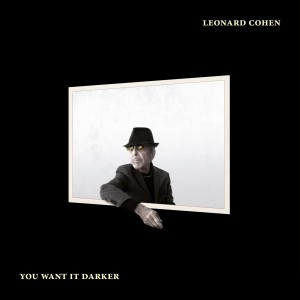 I was in the middle of writing a review of Leonard Cohen’s You Want It Darker when news came on Thursday, November 10, of his passing earlier in the week. It was obvious from the songs on this remarkable album and the October 17 profile of him by David Remnick in The New Yorker that Mr. Cohen was not long for this world. The album was already in the running for my favorite recording of the year, and the sad news of his death along with other dark news that fell upon us on this second week of November in the Year of Our Lord 2016 may just push it to the top.
I was in the middle of writing a review of Leonard Cohen’s You Want It Darker when news came on Thursday, November 10, of his passing earlier in the week. It was obvious from the songs on this remarkable album and the October 17 profile of him by David Remnick in The New Yorker that Mr. Cohen was not long for this world. The album was already in the running for my favorite recording of the year, and the sad news of his death along with other dark news that fell upon us on this second week of November in the Year of Our Lord 2016 may just push it to the top.
At the age of 82, and obviously faced with knowledge of his own mortality, Leonard Cohen released an album that is just as vital and important and true and confounding as anything he did in his long career. His first album was released 49 years ago, in 1967, and he was a late bloomer. It was only after a decade or more of failing to support himself by writing poetry and prose that the scion of a line of Canadian businessmen turned to music.
In 2016 the spirit remained willing, though the flesh was getting weak. Cohen toured relentlessly from 2008 until the end of 2013, at least in part to rebuild his bank accounts after a former manager emptied them while Cohen was living in a California Buddhist monastery. He amazed all and sundry with his energy, bounding on stage night after night, dropping to his knees regularly during the program in homage to various members of his band, the audience, and whatever muse he was addressing. The songs on You Want It Darker made it plain that those days were gone, but Cohen’s voice and most of all his artistic vision remained strong.
Strong and dark, as the punchline to a bad joke goes. Cohen never flinched from confronting mortality, and as the end neared he seemed almost to welcome the grim reaper with a wry joke and a nudge in the ribs. He was never shy about using religious and spiritual imagery – although he frequently confounded with lyrics that at one moment made him sound like an atheist and the next like the most devoted supplicant – and on his last record he took it more than one step further. On the hypnotic title track he employed a synagogue choir to back him as he engaged in a dialog with God, leading to the refrain of “Hineni, hineni, I’m ready, my lord.” Hineni is Hebrew for “Here I am,” what Abraham said when God called his name as a preface to asking him to sacrifice his son Isaac. When God calls your name, you know it’s going to cost you, but still all you can say is “Here I am.”
The album is full of gospel grooves, with occasional country touches like twanging baritone guitars and weeping pedal steel, as well as a stately string quartet. It’s beautifully and fully produced but gives an impression of starkness. Its eight songs are almost all the kind that can be interpreted either as a love song to another person or a devotional to a higher power. Some of those love songs are bitter, like “Treaty,” which is at once a confession and an indictment; others darkly humorous like “On The Level” in which he confesses that desire is long gone, but also looks back on a life when “I was fighting with temptation, but I didn’t want to win.”
And some are simply love songs of deep gratitude for those who helped stave off darkness and loneliness, like “If I Didn’t Have Your Love.” This one has some of the most tender love lyrics of his career, like: “If the sun would lose its light and we lived in endless night and there was nothing left that you could feel, that’s how it would be, what my life would seem to me, if I didn’t have your love to make it real.”
A song like “It Seemed the Better Way” feels like the confession of a lifelong spiritual seeker who knows he has followed more than one false prophet – and maybe one of those was even himself. Others are simple clear-eyed confessions of a poet nearing the end, like “Leaving The Table” and especially my favorite, “Traveling Light.” The minor-key mandolin tremeloes on this one sound to me like fond memories of his days in Greece with his beloved Marianne, as he heads off into the light on his final journey. I can’t say anything nearly as well as Leonard Cohen could, even on his deathbed, so I’ll leave you with “Traveling Light.”
(Sony, 2016)
